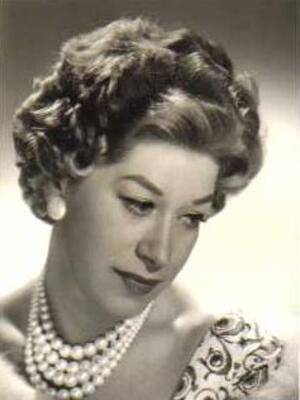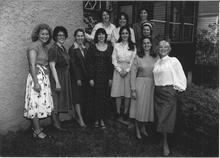Regina Resnik
Regina Resnik in 1968.
Courtesy of Wikimedia Commons
Opera singer Regina Resnik reinvented herself multiple times in her career, taking on unexpected new roles. Resnik began vocal training under Rosalie Miller at age thirteen but turned down a scholarship to Juilliard in favor of Hunter College, where she could also earn a teaching degree. She debuted in 1942 at the Brooklyn Academy of Music. She toured through the United States and internationally before her first performance at the Met in 1944. She quickly became the Met's leading soprano. In the 1950s her voice lowered in pitch, shifting her range from soprano to mezzo-soprano. Her new teacher, Giuseppe Danise, trained her voice for mezzo parts. She then traveled to Europe and became a sensation in London and Vienna. In the 1970s she successfully shifted from performing to directing operas.
Early Life and Family
Regina Resnik, world-famous opera singer and leading lady at New York’s Metropolitan Opera House, was born on August 30, 1922, in the Bronx, New York. From an early age, Resnik knew that she wanted to be an opera singer. Although her Jewish Russian immigrant parents could not afford to pay for singing lessons, Resnik began instruction at age thirteen with Rosalie Miller, who offered her free lessons. The match proved successful, and Resnik continued her studies with Miller during her college years and her professional career.
The singer was as precocious and disciplined in her academic studies as she was in her music. After skipping several grades, she attended a special junior high school where she could study German and Italian in preparation for her chosen vocation. Despite her ambitions, Resnik and her family knew that she faced difficult odds. She turned down a scholarship to the Juilliard School of Music, and instead attended Hunter College in New York. There, she could earn a bachelor’s degree in music education that would allow her to teach if she could not support herself as a professional singer.
Opera Career
Resnik need not have worried. In the early 1940s, her singing career took several definitive steps forward. She made her concert debut at the Brooklyn Academy of Music on October 27, 1942. In the same year, she made her operatic debut, portraying Lady Macbeth in the New Opera Company’s production of Verdi’s Macbeth in New York City. She also embarked on a national tour of the United States under the auspices of Pryor Concert Management of Council Bluffs, Iowa, giving forty concerts with choral societies, in university towns, and at women’s clubs and churches. She made her international debut in 1943 in Mexico City, singing Leonora in Beethoven’s Fidelio.
The following year, Resnik achieved a milestone in her career. She won the Metropolitan Opera auditions, and debuted at the Met on December 6, 1944, as a last-minute replacement for Zinka Milanov. The role was Leonora in Verdi’s Il Trovatore. Other leading roles that Resnik performed during her first season with the Met included the title role in Puccini’s Tosca, Santuzza in Mascagni’s Cavalleria Rusticana, and Leonora in Fidelio. Personal happiness coincided with public success when, in 1947, Resnik married lawyer Harry W. Davies, with whom she later had a son.
Following the triumph of her first season, Resnik became a leading soprano at the Met. Her roles from the mid-1940s to the mid-1950s included Ellen Orford in the New York premiere of Britten’s Peter Grimes, Alice Ford in Verdi’s Falstaff, Sieglinde in Wagner’s Die Walküre, and both Donna Anna and Donna Elvira in Mozart’s Don Giovanni. She also sang Sieglinde at the Bayreuth Opera House in Germany in 1953. During this period, she worked with many renowned conductors, including Edward Johnson, Jean Morel, Sir Thomas Beecham, and Bruno Walter. In addition, she learned a great deal about singing and the business of music from her manager, William Stein, and her accompanist, Leo Taubman.
Vocal Changes and Challenges
Resnik excelled in a wide variety of soprano roles at an unusually early age. However, in the mid-1950s, she faced an unexpected and traumatic challenge, which caused her career to change direction. Her voice gradually acquired the darker qualities of the lower mezzo-soprano, causing her difficulty in performance. When Rosalie Miller proved unable to help her through the transition from soprano to mezzo-soprano, Resnik sought the advice of Giuseppe Danise, who became her new teacher. Under his guidance, she abandoned her large repertoire of soprano roles and learned new mezzo parts that brought out the warm vocal color for which she became famous.
This vocal adjustment also caused problems with the Metropolitan Opera management. Resnik was shunned by the Met’s new director, Sir Rudolf Bing, who offered her only minor roles. This lack of appreciation forced her to go abroad to sing the leading roles she desired. The result was a highly successful career in Europe. She achieved particular success at Covent Garden in London, where she made her debut in the title role of Bizet’s Carmen in 1957, under the direction of David Webster. Her other London roles included Marina in Mussorgsky’s Boris Godunov, Mistress Quickly in Verdi’s Falstaff, and Klytamnestra in Strauss’s Salome. She sang Carmen in Vienna under the direction of Herbert von Karajan in 1957 and 1958, followed by performances in Berlin, Paris, and Stuttgart. Other successful roles in Europe included Amneris in Verdi’s Aïda, Fricka in Wagner’s Das Rheingold and Die Walküre, and Herodius in Salome. Despite occasional performances with the Metropolitan Opera, Resnik resigned in protest from the Met roster in 1967 when she was not cast as Carmen in the Met’s production of the opera. She later returned when the Met’s management recanted and offered her the role.
Legacy
Throughout her career, critics praised Resnik for her superb acting. She strove to add new dimensions to every role and to create dramatic force and subtlety. Carmen, Klytamnestra, Mistress Quickly, and the title role in Tchaikovsky’s The Queen of Spades were her favorite acting challenges. She was named Commander of the French Academy of Arts, Sciences and Letters, was named Kammersängerin in Austria, and was awarded the President’s Medal in the United States.
The 1970s and 1980s brought new pleasures and successes for Resnik. She married her second husband, painter Arbit Blatas, in 1975, and expanded her creativity to other areas of the opera. In the early 1970s, she began directing opera productions around the world. She has directed twelve productions in total, in San Francisco, Hamburg, Warsaw, Lisbon, Venice, Sydney, and Strasbourg. She explored her Jewish heritage in a documentary on the Venetian ghetto, which aired on public television in the spring of 1983.
Regina Resnik died on August 8, 2013. She was 90.
Discography
Der Ring des Nibelungen. Richard Wagner, Orchester der Bayreuther Festspiele / Joseph Keilberth / Hans Hotter / Ramón Vinay / Regina Resnik / Martha Mödl / Wolfgang Windgassen. 1953.
Vanessa mezzo-soprano vocals. Metropolitan Opera Orchestra and Chorus / Dimitri Mitropoulos / Eleanor Steber / Rosalind Elias / Regina Resnik / Nicolai Gedda / Giorgio Tozzi / George Cehanovsky / Robert Nagy. 1958.
Tristan und Isolde mezzo-soprano vocals. Richard Wagner, Vienna Philharmonic Orchestra / Georg Solti / Birgit Nilsson / Fritz Uhl / Regina Resnik / Tom Krause / Arnold van Mill. 1961
Die Fledermaus Highlights. Johann Strauss, Wiener Philharmoniker / Wiener Staatsopernchor / Herbert von Karajan / Hilde Güden / Erika Köth / Regina Resnik / Giuseppe Zampieri / Waldemar Kmentt / Walter Berry / Eberhard Waechter / Erich Kunz. 1965.
Falstaff contralto. Giuseppe Verdi, Arrigo Boito, Leonard Bernstein / Wiener Philharmoniker / Wiener Staatsopernchor / Dietrich Fischer-Dieskau / Ilva Ligabue / Regina Resnik / Graziella Sciutti / Juan Oncina / Rolando Panerai / Hilde Rössel-Majdan / Murray Dickie / Erich Kunz / Gerhard Stolze. 1966.
Elektra mezzo-soprano vocals. Richard Strauss, Hugo von Hofmannsthal, Wiener Philharmoniker / Sir Georg Solti / Birgit Nilsson / Regina Resnik / Marie Collier / Tom Krause. 1967.
The Anastasia Affaire. Studio Cast Album. 1992.
Salome mezzo-soprano. Richard Strauss, London Symphony Orchestra / Erich Leinsdorf / Montserrat Caballé / Sherrill Milnes / Regina Resnik / Richard Lewis. 2009.
Bloomfield, Arthur. “Our Critics Abroad: San Francisco.” Opera 34, no. 1 (February 1983): 179–182.
Cummings, David M. International Who’s Who in Music and Musicians Directory (1992).
EJ (1973–1982).
Mayer, Martin. “Our Critics Abroad: America, Mozart, and Sondheim: New York.” Opera 41, no. 1 (November 1990): 1313–1316.
“Reflected Glory: A Century at the Met.” Opera News 48, no. 4 (October 1983): 64–80.
“Regina Reflects: Forty Years After Her Met Debut, Mezzo Resnik Tells of Her Turbulent But Ultimately Fulfilling Career.” Opera News 49 (December 1984): 10–14, 58–60.
Resnik, Regina. Geto: The Historic Ghetto of Venice. Documentary, KQED San Francisco (1983).
Rich, Maria F., ed. Who’s Who in Opera (1976).
Rosenthal, Harold. “Regina Resnik.” In The New Grove Dictionary of Music and Musicians, edited by Stanley Sadie (1988).
Slominsky, Nicolas, ed. Baker’s Biographical Dictionary of Musicians (1984).




